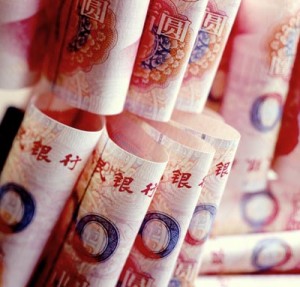LIMA, Oct. 12 (Xinhua) — Thanks to its push to internationalize the renminbi, China in recent years has seen places as far away as Santiago, Luxembourg, Ottawa and Kuala Lumpur become centers for trade involving the Chinese currency.
However, the Chinese government is now seeking for a more meaningful prize: the inclusion of the renminbi to the Special Drawing Rights (SDRs), the IMF’s international reserve asset used to back up member countries’ official reserves.
The SDRs can not be used to directly purchase goods or services. However, they can be exchanged between IMF member countries for hard currency among the U.S. dollar, the pound, the euro and the yen in the basket.
Therefore, adding the renminbi to this elite list would not only raise its status, but also allow countries to cash in their SDRs for the Chinese currency, easing their trade in China and giving them another option for how to hold their foreign reserves.
The IMF is currently engaged in a review of the SDR basket to analyze if any changes should be made to its makeup.
The first step of this review ended on Aug. 11, when the IMF Executive Board voted to extend the current makeup of the SDR until Sept. 30, 2016. The IMF said this was done to satisfy SDR users that were against short-term changes in order to ensure that current operations would continue to run properly.
However, it may well be likely that this was done in order to allow time for central banks to prepare for the RMB to be added to the SDR starting next September.
IMF Managing Director Christine Lagarde said earlier this month “the IMF will complete a technical assessment (on the renminbi) before the end of 2015. This is nearly completed and recommendations are being finalized. The review will determine implementation from September 2016 to allow time for central banks to adjust.”
Speaking to the IMF Survey magazine in August, Siddharth Tiwari, the IMF’s Director of Strategy, Policy and Review, said, “the RMB is the only currency not currently in the SDR basket that meets the export criterion. Therefore, a key focus of the current review will be whether the RMB also meets the freely usable criterion in order to be included.”
“The review is well underway. Staff continues its technical work, including on addressing data gaps and operational issues, while liaising closely with Chinese authorities…ahead of the formal Board meeting expected later in 2015,” said Tiwari.
The depreciation of the renminbi had some analysts concerned, but the IMF has defended the move, saying it brought China’s exchange rate in line with market rates.
The depreciation also found unexpected allies. The Wall Street Journal wrote on Sept. 2 that “The move has won over the IMF.” In the eyes of the financial daily, “a move to make the country’s exchange rate more market-determined…combined with Beijing’s careful management of the currency…is bolstering China’s bid to get the yuan included” in the SDR.
The Wall Street Journal’s position is not surprising, when seen from a common vantage point.
The IMF said that, to join the SDR, a currency must be “freely usable,” referring to its popularity in international trades. However, the depreciation of the renminbi in no way affected the ability to use the currency in this way.
According to The Economist, in 2014, the renminbi was the 7th most used currency in terms of global reserves. If the IMF therefore pays more attention to the influence of the renminbi than to accusations of capital controls, adding it to the SDR will become far more viable.
China will also continue to push ahead financial reforms with the hope that the renminbi can be included in the SDR basket later this year, said Yi Gang, deputy governor of the People’s Bank of China, at the IMF annual talks in Lima.
China has opened its inter-bank bond market and forex market to overseas financial institutions and has been promoting data transparency, following SDR requirements, Yi said.
The central bank has recently further freed the RMB exchange rate through changes to the central parity rate mechanism to make the exchange rate more flexible, he said.
